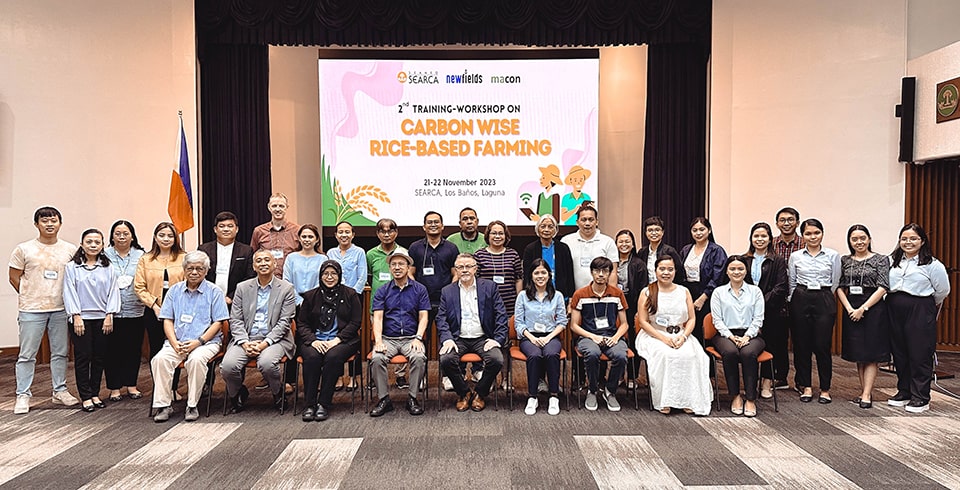 Participants and facilitators, alongside Dr. Glenn Gregorio, Center director; Dr. Nur Azura Binti Adam, deputy director for programs; Atty. Eric Reynoso, program head, Emerging Innovation for Growth Department; and Dr. Eero Nissila, managing director of Newfields Consulting Ltd.
Participants and facilitators, alongside Dr. Glenn Gregorio, Center director; Dr. Nur Azura Binti Adam, deputy director for programs; Atty. Eric Reynoso, program head, Emerging Innovation for Growth Department; and Dr. Eero Nissila, managing director of Newfields Consulting Ltd.
LOS BAÑOS, Philippines - The Southeast Asian Regional Center for Graduate Study and Research in Agriculture (SEARCA), in collaboration with Newfields Consulting Ltd. (NFC) and Macon Ltd., conducted the second installment of the training-workshop series on Carbon Wise Rice-based Farming on 21–22 November 2023 at SEARCA Headquarters, Los Baños, Laguna.
The second workshop was attended by 28 participants from the Provincial and Municipal Agricultural Offices of Laguna, faculty and researchers from the University of the Philippines Los Baños, Central Luzon State University, and the private sector. The training-workshop provided an in-depth discussion on the importance of the available platforms for monitoring, reporting, and verification (MRV) carbon emissions. In particular, the training-workshop introduced the Carbon Wise Rice Information Management System (CWRIMS), a web-based application that allows farm-level data collection of carbon emissions.
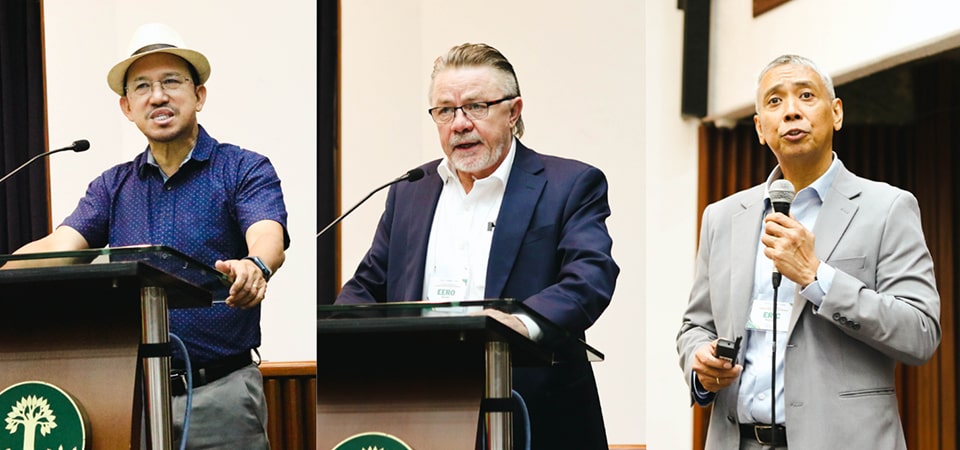 (L-R) Dr. Glenn Gregorio, SEARCA director; Dr. Eero Nissila, managing director of Newfields Consulting Ltd.; and Atty. Eric D. Reynoso, program head of the Emerging Innovation for Growth Department.
(L-R) Dr. Glenn Gregorio, SEARCA director; Dr. Eero Nissila, managing director of Newfields Consulting Ltd.; and Atty. Eric D. Reynoso, program head of the Emerging Innovation for Growth Department.
During their introductory addresses, Dr. Gregorio and Dr. Nissila emphasized the significance of carbon credits and green funds, highlighting the Southeast Asian initiatives advocating carbon farming practices. They also heightened the importance of disseminating climate-smart agriculture technologies at the grassroots level.
Subsequently, Dr. Nissila delivered a presentation on the principles of carbon-wise farming systems. He expounded on the potential of out-grower co-op systems and consolidation of farms to increase access to financing, processing, marketing resources, technologies, and training. He also introduced the Carbon Wise Information Management System, a general platform for managing various carbon emission data applications. This system aims to streamline data collection, facilitating the transition to decarbonization, enhancing profitability, and aligning with the objectives of the Paris Agreement.
Atty. Reynoso then presented SEARCA's current initiatives on carbon emission measurement and reduction. These include implementing a program on Carbon Farming as one of the nature-based solutions to reduce GHG emissions in agriculture. The program is currently benchmarking policies and methodologies related to carbon farming in selected Southeast Asian countries. Atty. Reynoso also shared about the Carbon Footprint Project of SEARCA, which intends to measure the Center's baseline carbon footprint and develop a carbon footprint calculator to estimate the carbon footprint for succeeding years.
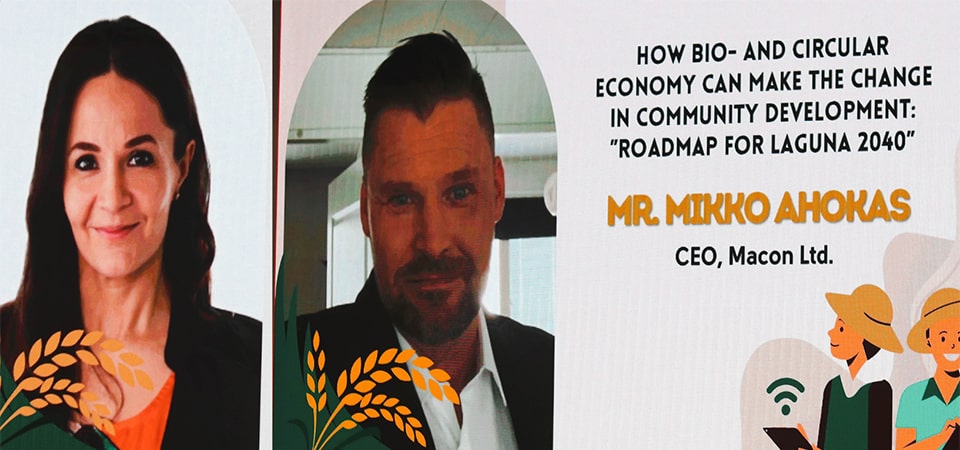 (L-R) Ms. Sanna Taskila and Mr. Mikko Ahokas, representing Macon Ltd., delivered a presentation on bio- and circular economy.
(L-R) Ms. Sanna Taskila and Mr. Mikko Ahokas, representing Macon Ltd., delivered a presentation on bio- and circular economy.
CEO Mr. Mikko Ahokas and Ms. Sanna Taskila, both of Macon Ltd., delivered a presentation on the transformative potential of bio- and circular economy in community development, in which they emphasized its significant contribution to environmental sustainability, economic growth and innovation, social benefits, and cultural integration. They also established an interlink between the two economies, encompassing standard measures for enhancing energy efficiency, decreasing dependence on fossil fuels, implementing climate-related initiatives, and exerting influence through urban planning, land use policies, and support for renewable energy initiatives. Success stories of municipalities employing practical approaches and exemplifying ten best practices were presented, showcasing notable accomplishments such as emission reduction, heightened energy efficiency, and positive community impacts.
The afternoon session started with Ms. Carumba, senior software engineer at NFC, introducing the CWRIMS, a web-based application developed by NFC. Ms. Carumba presented the concepts underlying the development of CWRIMS and its advantages in terms of MRV. She showcased the diverse features and functionalities of the app through a hands-on demonstration, providing a visual representation of its capabilities.
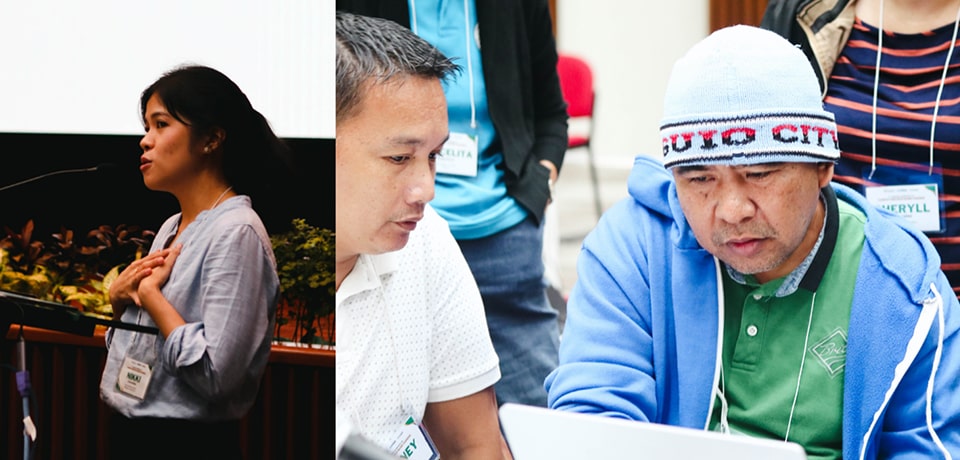 (L-R) Ms. Nikki Carumba, a senior software engineer at NFC, introduced the CWRIMS in the afternoon session. Participants actively participated in the hands-on demonstration.
(L-R) Ms. Nikki Carumba, a senior software engineer at NFC, introduced the CWRIMS in the afternoon session. Participants actively participated in the hands-on demonstration.
The hands-on exercises were continued on the second day, providing participants an opportunity for comprehensive interaction with the web application. Participants shared their individual experiences, feedback, and suggestions on the web application's usability and functionality to enhance the web application.
The workshop concluded with remarks from Dr. Nur Azura Binti Adam, deputy director for programs, who reiterated the crucial significance of collaboration among local government units, the academic community, and the private sector. Dr. Nur announced the possibility of organizing the 3rd training-workshop in March or April 2024 to present the improved version of CWRIMS and explore the potential of implementing the app in field trials.
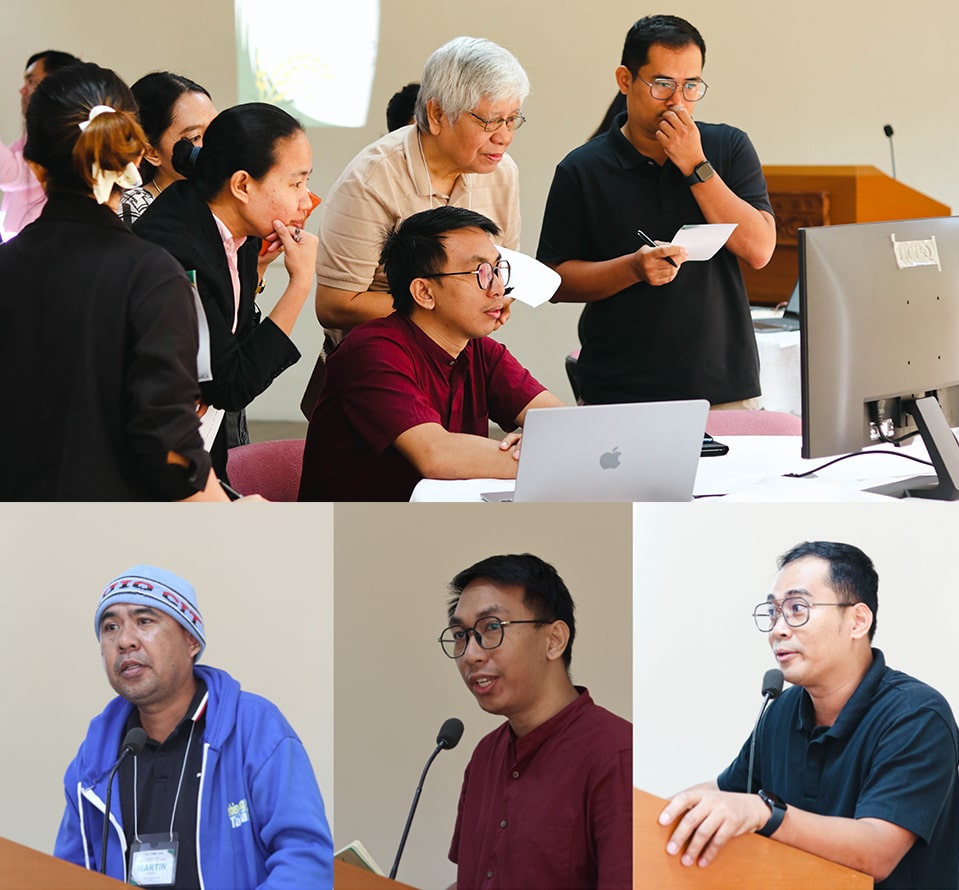 (Top) Participants actively engaged in the hands-on demonstration during the second day of the workshop. (Bottom) Participants shared their recommendations and feedback on their user experience with the web application
(Top) Participants actively engaged in the hands-on demonstration during the second day of the workshop. (Bottom) Participants shared their recommendations and feedback on their user experience with the web application
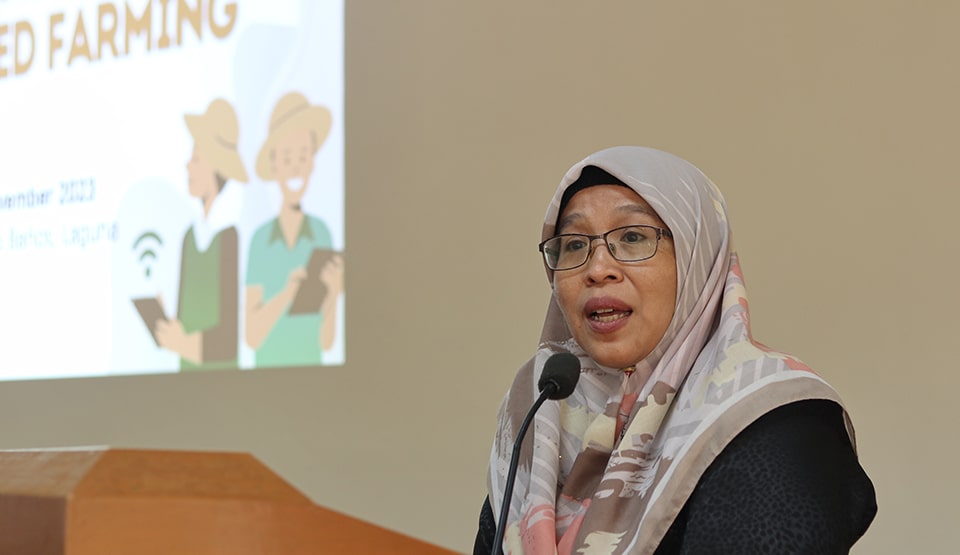 Dr. Nur Azura Binti Adam, deputy director for programs, during her concluding statements on the 2nd day of the workshop
Dr. Nur Azura Binti Adam, deputy director for programs, during her concluding statements on the 2nd day of the workshop
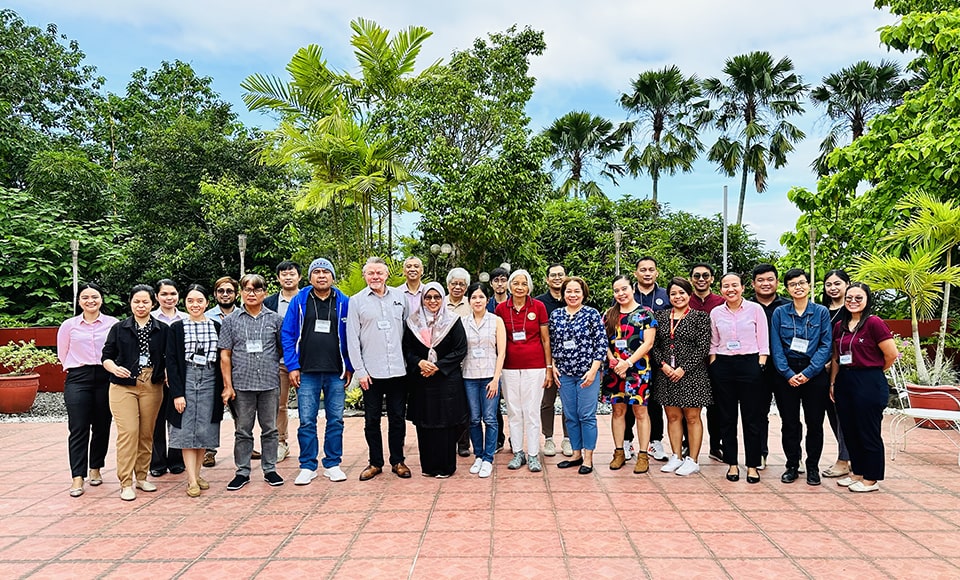 Resource persons, participants, and facilitators during the conclusion of the 2-day training-workshop
Resource persons, participants, and facilitators during the conclusion of the 2-day training-workshop